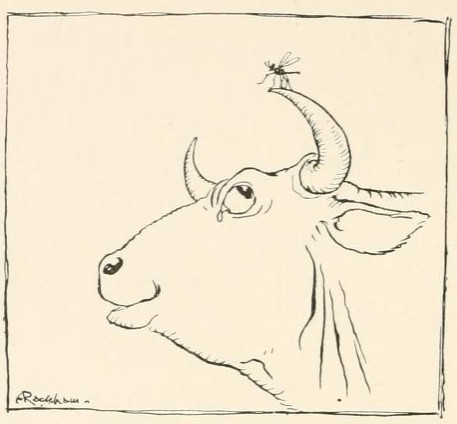A First Greek Reader for Use at Eton, by Edmund Fowle. Internet Archive link. This is reading 11. There are notes for each story that provide some context along with detailed comments on the Greek. The reading materials come from Jacobs.
Ὀπφεύς, Καλλιόπης Μούσης καὶ Οἰάγρου υἱός, ᾄδων ἐκίνει λίθους τε καὶ δένδρα. Ἀποθανούσης δὲ Εὐρυδίκης, τῆς γυναικὸς αὐτοῦ, δηχθείσης ὑπὸ ὄφεως, κατῆλθεν εἰς ᾅδου καὶ Πλούτωνα ἔπεισεν ἀναπέμψαι αὐτήν. Ὁ δὲ ὑπέσχετο τοῦτο ποιήσειν, ἂν μὴ πορευόμενος Ὀρφεὺς ἐπιστραφῇ, πρὶν εἰς τὴν οἰκίαν αὑτοῦ παραγενέσθαι. Ὁ δὲ ἀπιστῶν ἐπιστραφεὶς ἐθεάσατο τὴν γυναῖκα· ἡ δὲ πάλιν ὑπέστρεψεν.
Ὀπφεύς,
υἱός
Καλλιόπης Μούσης καὶ Οἰάγρου,
ᾄδων
ἐκίνει
λίθους τε καὶ δένδρα.
Εὐρυδίκης δὲ ἀποθανούσης
τῆς γυναικὸς αὐτοῦ,
δηχθείσης
ὑπὸ ὄφεως,
κατῆλθεν εἰς ᾅδου
καὶ ἔπεισεν Πλούτωνα
ἀναπέμψαι αὐτήν.
Ὁ δὲ
ὑπέσχετο
ποιήσειν τοῦτο,
ἂν μὴ
Ὀρφεὺς,
πορευόμενος,
ἐπιστραφῇ,
πρὶν
παραγενέσθαι
εἰς τὴν οἰκίαν αὑτοῦ.
Ὁ δὲ,
ἀπιστῶν,
ἐπιστραφεὶς
ἐθεάσατο τὴν γυναῖκα·
ἡ δὲ
πάλιν ὑπέστρεψεν.
of the Muse Calliope
and of Oeagrus
Καλλιόπης Μούσης καὶ Οἰάγρου
υἱός,
moved stones and trees
ἐκίνει
λίθους τε καὶ δένδρα.
died
τῆς γυναικὸς αὐτοῦ,
to Hades
to do this
τοῦτο ποιήσειν,
as he went,
Orpheus not turn around
πορευόμενος
Ὀρφεὺς ἐπιστραφῇ,
reaching his own home
παραγενέσθαι.
being in doubt
and saw his wife
ἐθεάσατο τὴν γυναῖκα·
went back down






